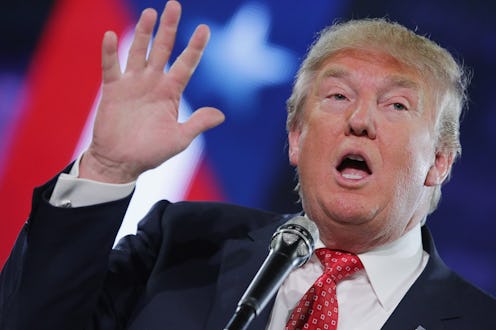News
Trump Criticizes, Claims Credit For Prisoner Swap
Shortly after Iran released four American captives in a prisoner swap with the U.S., Donald Trump took to the stage at Liberty University to condemn the deal. It may seem weird for an American presidential candidate to criticize an arrangement that ended with the successful release of imprisoned Americans, but hey, it’s Trump we’re dealing with. Naturally, Trump’s criticisms of the Iran prisoner swap make no sense, and bear only a minimal relationship to objective reality.
Before criticizing the swap, Trump had taken credit for it. The day the release was announced, Trump said at a Tea Party rally in South Carolina that “I might have had something to do with” it, citing how he’s been “hitting [Iran] hard.” Sure, every Republican in the country has been criticizing Iran for the better part of 30 years, but Trump clearly did so in a way that spooked Iranian leaders so much that they had no choice but to release the Americans. That’s how you #MakeAmericaGreatAgain.
But days later, Trump began criticizing the deal. As with most of his speeches, his comments were disjointed and rambling, but he made a few distinct claims. After complaining that the swap “took forever to get done,” he insisted that it should have been “part of the deal three years ago, when they started talking about the [Iran nuclear] deal.” The better way to go about it, Trump said, would have been to “get up [and] leave the room” if the Iranians didn’t agree to release the prisoners immediately, and then immediately “double up the sanctions” against Iran.
“Within 48 hours, [Iran] will call and say, ‘we want our prisoners back, and here’s your prisoners,’” Trump proclaimed to applause.
Let’s take this point by point. First of all, most of the Americans hadn’t even been imprisoned for three years, so it would have been impossible to start negotiating their release back then. Furthermore, it’s not like the U.S. only thought to bring up the prisoners at the last minute. In fact, U.S. and Iranian diplomats secretly negotiated the swap over the course of 14 months, and this was while the two countries were discussing the nuclear deal. Both initiatives took time — the U.S. and Iran haven’t had official diplomatic relations for over three decades, after all — and both ended in success.
Of course, it’s very easy to say that a successful deal took too long to get inked when you had nothing to do it. Nevertheless, the idea that Trump could have just stormed into the room and strong-armed the Iranians — or “the Persians, very good negotiators,” as he called them — into submission is laughable.
Next, Trump proposed that the U.S. should have instead just increased sanctions on Iran, and that this would have procured the prisoners’ release. This reflects a long-held Republican position — I don’t want to say “belief,” because I don’t think most of them actually believe it — that crippling Iran economically is the best way to get it to play nice with the U.S. This, too, is a fantasy.
America has been imposing sanctions on Iran since 1979. It has done so increasingly and repeatedly, and the only result has been to increase Iranian grievances against the U.S. and convince the regime to obstinately dig in its heels. As political scientists have explained in books that Trump probably hasn’t read, purposefully crippling a country's economy almost always results in that country becoming more geopolitically isolated than it was before.
Trump’s baseless criticism of the Iran prisoner swap reflect two distinct things: his own lack of diplomatic experience and the Republican Party’s knee-jerk impulse to use only aggression and punishment in dealing with Iran. The Obama administration, by contrast, has utilized patience and diplomacy to thaw U.S.-Iranian relations, and the result is that four American prisoners are free and Iran has shuttered most of its nuclear program. Unless Trump wants to argue that these are undesirable outcomes, it’s not clear what appeal the Republican alternative has.
